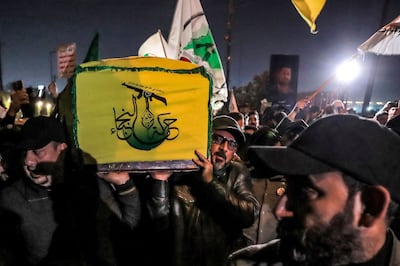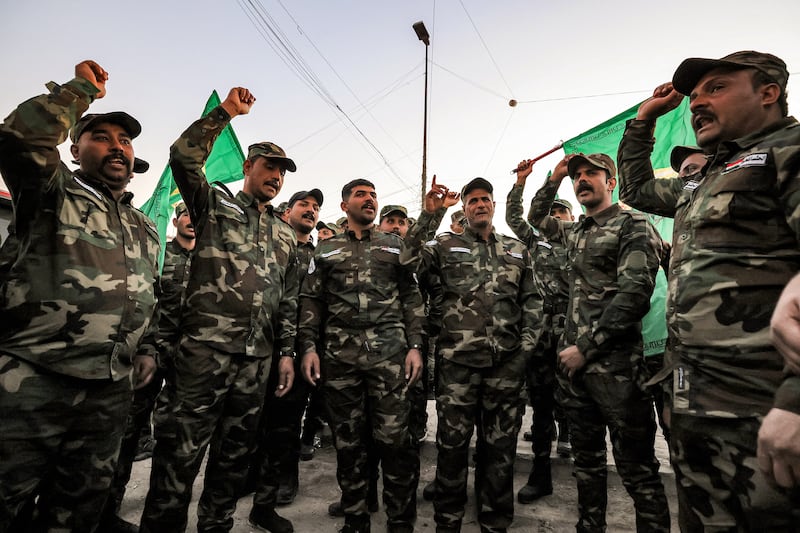Live updates: Follow the latest from Israel-Gaza
A powerful Iraqi paramilitary group backed by Iran vowed on Friday to continue targeting American troops despite imminent US strikes in retaliation for an attack that killed three soldiers.
Sunday's attack against a US base just inside Jordan was blamed by Washington on the Islamic Resistance in Iraq, an Iran-backed group of militias that includes Harakat Al Nujaba.
US President Joe Biden vowed to retaliate, and Defence Secretary Lloyd Austin suggested that strikes against Iran-backed militias would be in the form of a “multi-tiered response”.
As Iran-backed groups in Iraq and Syria brace for the imminent US strikes, Harakat Al Nujaba said it “won’t stop” its attacks against the US forces until Israel’s war in Gaza “comes to an end and the American occupiers leave Iraq”.
It added that its decision is “Iraqi”, implying there were no external influences.
The statement came after Kataib Hezbollah, another powerful Iran-backed militia group under the same umbrella, announced on Tuesday that it was suspending attacks against US targets, two days after the deadly strike in Jordan.
That decision followed a visit to Baghdad by a senior Iranian commander to call off anti-US strikes by militias, sources told The National on Thursday.
Iran's quick involvement at a senior level suggests Tehran is keen to avoid any uncontrolled escalation with the US, as tensions are high across the region, with the Israel-Gaza war threatening to spill over into a wider regional conflict.
Harakat Al Nujaba is supported by Iran's Islamic Revolutionary Guard Corps' Quds Force, which provides weapons and training for militias in Iraq. It was established in 2013 and has fighters in Iraq and Syria.
In its statement, the Iraqi group said that “any targeting will be met with an appropriate response,” referring to the imminent US strikes.

The US response could lead to a war with Iran if it does not tread carefully, analysts have warned.
After previous attacks on its troops, the US has responded by striking Iran-linked targets in Iraq and Syria with the aim of deterring further violence. A large strike on similar targets is now considered likely.
Earlier in January, the US military struck a base in eastern Baghdad used by Iran-backed armed groups, killing a commander who had conducted attacks on American forces in Iraq and Syria, the Pentagon said.
Among those killed was Mushtaq Jawad Kazim Al Jawari, who was a senior member of the Harakat Al Nujaba militia.
But some in the US Congress are calling for a more extreme response, such as strikes against military targets within Iran, a move that could lead to a wider regional war.
Washington has faced similar dilemmas, including repeated decisions of how to respond to attacks on US troops by the Iran-backed Kataib Hezbollah militia in Iraq while maintaining relations with the Iraqi government and avoiding war with Iran.
The biggest target could be the militia stronghold of Jurf Al Sakhar in Iraq. The US has repeatedly bombed the town, most recently hitting Kataib Hezbollah headquarters, storage and training locations for rocket, missile and one-way attack UAV capabilities.
The US could strike militia commanders linked to Iran, or even Iranian advisers themselves within Iraq. A more provocative response than striking Iran-linked sites and groups in Iraq would be to attack Iranian ships.
Iranian President Ebrahim Raisi said on Friday that any attack against Iran would be met with a firm response.
"We have said many times that we will not be the initiator of any war, but if a country, a cruel force wants to bully, the Islamic Republic of Iran will respond firmly," Mr Raisi said, on a visit to an IRGC navy base in Bandar Abbas.
"Today, the enemy has no ability to do anything against us; because they know that our forces are powerful and capable," he said.
Against this backdrop of regional tension inflamed by Israel’s war on Gaza, Mr Biden faces a difficult balancing act.







